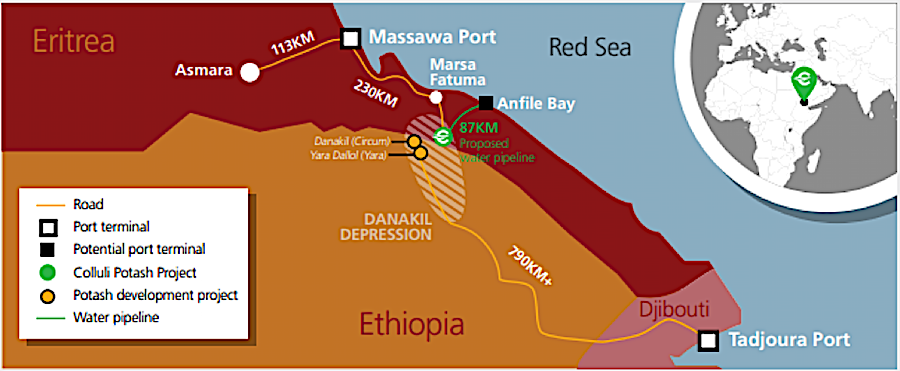Danakali about to secure financing for potash project in Eritrea
Australia's Danakali's (ASX, LON:DNK) said Monday it was about to close debt financing agreements worth $200 million with two African financial institutions, which will allow it fund construction and growth of its flagship Colluli potash project in Eritrea.
The deals with African Export-Import Bank (Afreximbank) and Africa Finance Corporation (AFC) could be finalized "any day" and are expected to accelerate equity financing, executive chairman Seamus Cornelius said at Dakali's Annual General Meeting.
Development of the 1.1 billion-tonnes potash project, a joint venture between the Australian miner and Eritrea's state mining company, is expected to take 2 and a half years.
UN study says the Colluli potash project has the potential to significantly boost Eritrea's economy and advance the country's sustainable development agenda.In the initial phase of operation, Colluli would produce more than 472,000 tonnes a year of sulphate of potash (SOP), a premium grade of fertilizer. Annual output could rise to almost 944,000 tonnes if Danakali decides to go ahead with a second phase of development, as the project has a possible 200-year plus mine-life.
Game changer
A United Nations report published in January suggested that Colluli could boost the economy of Eritrea, a country that until last year was on the UN's sanctions list.
The independent study, commissioned and funded by the UN Development Program (UNDP), also said the project could "meaningfully" advance the north African nation's sustainable development agenda.
The future looks rosy. Danakali already has an offtake agreement with EuroChem, one of the world's top fertilizer companies, which has agreed to buy at least 87% of Colluli's output for 10 years.
The project location has its pros and cons. On one hand, being so close to the Red Sea coast by Eritrea's eastern border, makes it one of the world's most accessible potash deposits. As mineralization begins at 16 metres, it is also the world's shallowest. Additionally, its proximity to ports will provide easy access to Asian markets.
Colluli is also by the border with Ethiopia, with which Eritrea held one of Africa's deadliest border wars. In June 2018, the ruling coalition of Ethiopia (Ethiopian People's Revolutionary Democratic Front), headed by Prime Minister Abiy Ahmed, agreed to fully implement the peace treaty signed with Eritrea in 2000, with peace declared by both parties in July last year.


Colluli's location. (Courtesy of Danakali.)